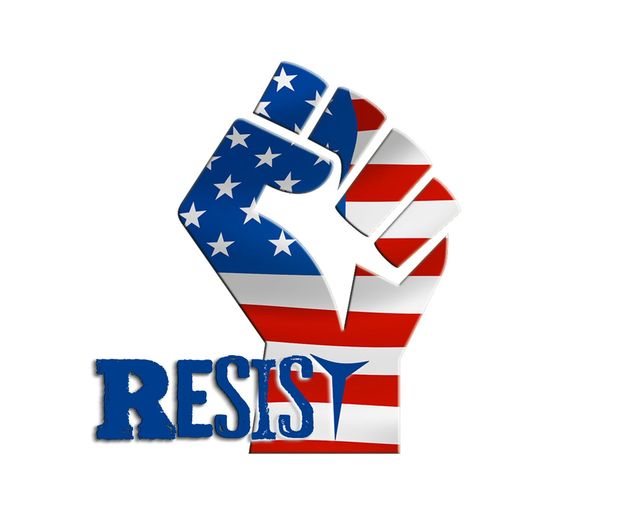Bias
"The Resistance" Is Bipartisan
Americans think they're hyper-polarized, but survey data show otherwise.
Posted January 24, 2020

If you’re like me, the term Resistance quickly evokes an anti-fascist sentiment (and, of course, the recent Star Wars films). In the era of Donald Trump’s presidency, many have used #Resist to refer to a left-wing grassroots American political movement. I’m here to tell you: The Resistance is bipartisan. And there’s a lot of psychology to back this up.
If you identify with the Resistance, you likely oppose authoritarianism, belligerence, prejudice, and bigotry, while supporting the ideals of fairness, justice, and equality. Well, your political opponents do too. And that’s an important idea that has been lost in the ongoing discussions about polarization. Most people across the political aisle hold the same values as you do. Most people have no love for racism, violence, or tyranny.
So when we make sweeping generalizations of large groups of people (e.g., “Trump voters are racist”), this is based on false beliefs. We are perversely ignoring the psychological similarities we all share. Put another way, your mind is very similar to the minds of those who voted for a different political candidate in the last election. We perceive those in other political groups to be standing for fundamentally different things, but this is a misunderstanding.
Studies by the More in Common research group illustrate this misunderstanding. Their group aims to combat negative polarization and increase social cooperation, in part by highlighting many of our false assumptions about political attitudes. They have conducted surveys on Americans’ political attitudes by asking about their agreement with a variety of statements including:
- “Racism still exists in America.”
- “Properly controlled immigration can be good for America.”
- “Donald Trump is a flawed person.”
- “People are right to be concerned about how climate change might affect us.”
- “The US should have completely open borders.”
- “I am proud to be American though I acknowledge my country’s flaws.”
- “America should be a socialist country.”
In one survey, they asked people to estimate the percentage of Republican/Democratic voters who agreed with these statements, in order to examine their accuracy about others’ attitudes. That is, would Democrats correctly estimate the percentage of Republicans who think that we should be concerned about climate change? Would Republicans correctly estimate how many Democrats think that America should turn to socialism? Before reading any further, ask yourself—what percentage of Republicans do you think would agree that Trump is a flawed person? What percentage of Democrats do you think support open borders and socialism?
Based on those survey items, Democratic voters estimated that only 52 percent of Republicans would agree with the statement, “Properly controlled immigration can be good for America,” but actually 85 percent of Republicans agreed with that statement. This indicates a 33 percent perception gap. It also suggests that on the issue of immigration, Republicans are more progressive than stereotypes would suggest (especially given Trump’s anti-immigrant rhetoric and policies).
The same survey found that a solid majority of Republicans agreed that racism and sexism still exist, and agreed that the government should do more prevent criminal access to guns. And just under 50 percent agreed that Trump is a flawed person. But Democratic voters’ estimates were way off for most of those items—they dramatically underestimated how progressive Republicans’ views were.
Republican voters were inaccurate, too. They estimated only 48 percent of Democrats who felt proud to be American (it was actually 85 percent). They also largely underestimated the percentage of Democrats who agreed that we should not become a socialist country (62 percent) or have totally open borders (71 percent), and agreed that law-abiding citizens should have the right to bear firearms (68 percent). So the average Democratic and Republican voters are more alike than different, but they are unaware of just how much in common they have—at least in terms of policy attitudes. Read the full Perception Gap report here.
The researchers (Daniel Yudkin, Stephen Hawkins, and Tim Dixon) concluded that Americans may be a lot less divided than they think. Our beliefs about polarization may, in fact, be a misunderstanding. But what explains this? Why the gigantic misunderstanding? The authors pointed to some variables (e.g., media consumption, education) that may be causing this phenomenon, and we’ll discuss these in future blog posts.
I largely agree with the authors’ conclusions, but I’m going to go one small step further. Based on the premise that most liberals and conservatives are more psychologically alike than different, I think that we are natural allies in the movement for positive social change. This includes shifting our society toward more small-d democratic values (e.g., freedom, peaceful cooperation, loyalty), or as Superman put it, the fight for “truth, justice, and the American way.” The socially progressive and anti-fascist Resistance movement would be well-served by an approach that was inclusive of mainstream conservative values and citizens—what many call “bipartisanship,” or “multi-partisanship.” This is what I call the Resistance Hypothesis.
References
Yudkin, D., Hawkins, S., & Dixon, T. (2019). The Perception Gap: How False Impressions are Pulling Americans Apart. More in Common.
Image by ArtWithPam from Pixabay




